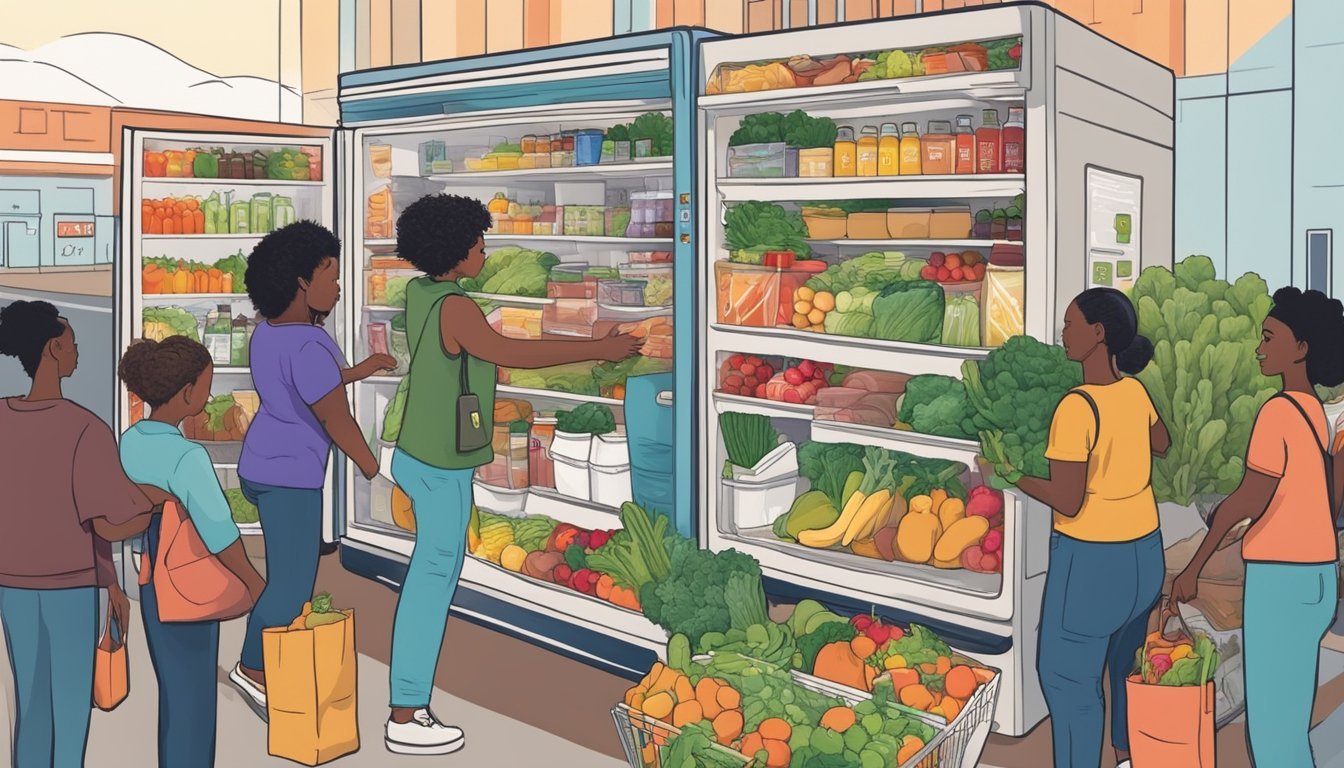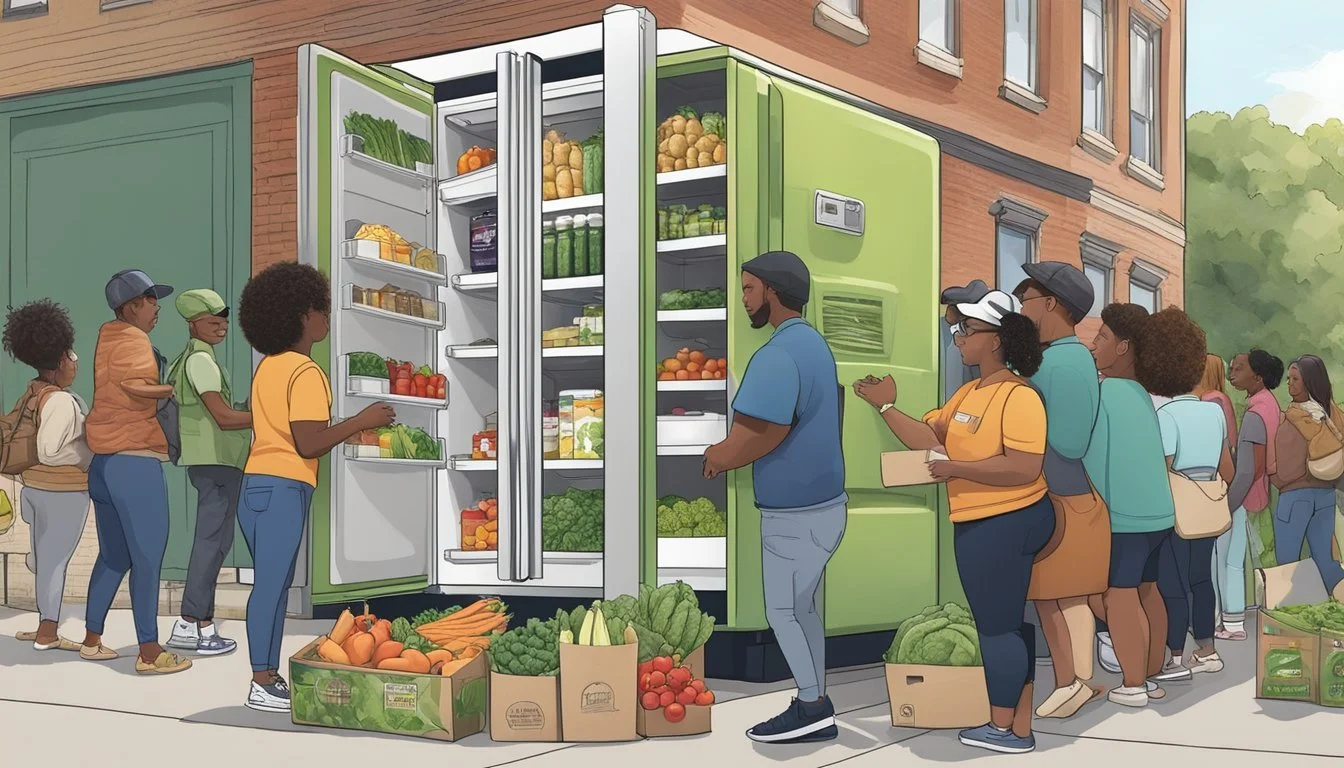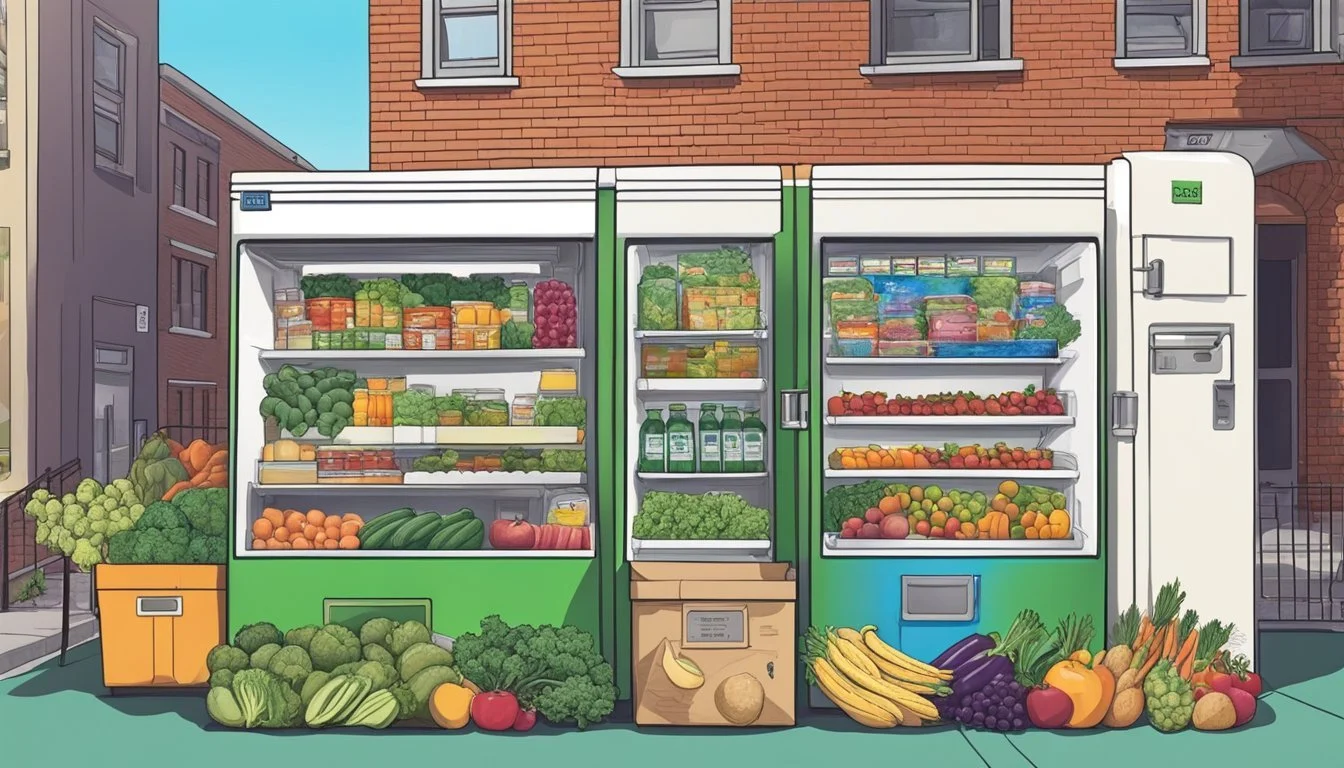Memphis, TN Community Fridge
Nourishing Neighborhoods through Sharing
In Memphis, Tennessee, an innovative initiative aimed at combating food insecurity has taken shape in the form of community fridges. These publicly accessible refrigerators are strategically placed throughout the city to provide free food to anyone in need, embodying a communal spirit and a shared responsibility towards addressing hunger.
The 901 Community Fridges project is a grassroots effort that operates on the basis of partnerships with local neighborhoods, businesses, and community organizations. By installing these fridges and keeping them stocked with food and essential sundries, the initiative ensures that they are not only a symbol of support but also a practical response to the pressing issue of food scarcity in the area.
Each fridge becomes a hub of benevolence and mutual aid, a testament to the community’s resolve to offer a helping hand to those facing financial strain. The placement of these fridges in easily accessible locations underlines the inclusive approach of the 901 Community Fridges project, as it reinforces the core belief that availability of nutritious food is a right, not a privilege.
Background of Community Fridges in Memphis
Community Fridges in Memphis are a noteworthy measure against food insecurity, brought forward by grassroots movements and dedicated organizations like 901 Community Fridges, which collaboratively work towards community sustenance and support.
Roots of the Community Fridge Movement
The concept of community fridges started as a grassroots initiative aimed at combating food wastage and hunger. In Memphis, the movement took shape with the realization that many residents faced food insecurity on a daily basis. The community fridges serve as a direct response to this need, providing a platform where individuals can freely access food and essential items.
The Role of 901 Community Fridges
901 Community Fridges emerged as a key player in Memphis' efforts to fight food insecurity. They spearhead the installation and maintenance of these community fridges. Each fridge is stocked with food and everyday necessities, available without cost to anyone who needs them. Their role extends beyond provision to fostering a sense of community through neighborhood partnerships and collective care.
Food Insecurity in Memphis
Food insecurity in Memphis is more than a statistic; it's a daily challenge for many. The presence of community fridges is a testament to the city's acknowledgment of the issue and its commitment to finding localized solutions. By establishing community fridges, Memphis confronts food scarcity head-on, allowing easy, stigma-free access to food resources for all residents in need.
Current Locations and Operations
The 901 Community Fridges initiative operates several fridges placed strategically across Memphis to alleviate food insecurity. Focusing on accessibility and community support, these fridges provide free food to anyone in need.
First Congregational Church Fridge
Located at the First Congregational Church in the historic Cooper Young neighborhood, this fridge serves as a vital community pantry. It ensures that individuals and families in the area have access to food without barriers.
Cooper Young Community Fridge
The Cooper Young Community Fridge, positioned in a well-known arts district, further demonstrates the initiative's commitment to supporting vibrant Memphis communities. This fridge operates as a public pantry, stocked by locals who contribute to their neighbors' well-being.
Expansion to Other Neighborhoods
The initiative is dedicated to expanding its reach to other Memphis neighborhoods in dire need of resources. Focused efforts are on placing additional fridges in areas such as Binghampton, Orange Mound, Raleigh, Whitehaven, and Frayser. Each location is chosen with the aim to provide maximum accessibility to nutritious food for as many residents as possible.
Participation and Community Involvement
The success of the Memphis Community Fridge initiative is reliant on active participation from local volunteers, the dedication of community activists like LJ Abraham, and partnerships with various organizations and groups to maintain and stock the fridges regularly.
Volunteer Efforts and Coordination
Volunteers are the backbone of the Community Fridge initiative, ensuring the fridges are consistently stocked and maintained. They coordinate efforts through various channels to provide fresh food and essentials to people facing food insecurity. Rosters for volunteering are set up to facilitate smooth operation and timely restocking of the fridges.
Community Activist Contributions
Community activists, notably LJ Abraham, play a crucial role in advocating and raising awareness for the project. Their contributions span from on-the-ground actions to strategizing outreach efforts in order to expand the impact of the community fridge program across Memphis neighborhoods.
Local Organizational Partnerships
Partnerships with local organizations amplify the reach and capability of the community fridge initiative. These organizations collaborate to identify strategic locations for the fridges, secure resources, and engage the community at large. Such alliances are vital for sustaining the initiative and ensuring that the fridges serve as reliable food access points.
Donation Guidelines and Food Safety
The Memphis Community Fridge initiative encourages donations of fresh food and pantry items while emphasizing the importance of food safety to ensure that all contributions are safe and beneficial for the recipients.
Acceptable Food Items
The following items are welcomed by the Memphis Community Fridge project:
Fruits & Vegetables: Fresh produce that is clean and unspoiled.
Bread & Bakery: Packaged items that are still within their consumption date.
Dry Goods: Such as rice, pasta, cereal, and dried beans that are sealed and non-perishable.
Canned Foods: Including vegetables, soups, and fruits with intact labels and within the expiration date.
Pre-Packaged and Prepared Foods: Must be unopened and clearly labeled with ingredients and expiration dates.
Prohibited Donations
There are specific items that cannot be accepted:
Raw Meat: Due to food safety concerns, raw meats are not allowed.
Prepared Meals: Homemade meals or opened pre-packaged meals are not permitted.
Expired Foods: Any items that are beyond their expiration date.
Damaged or Unlabeled Canned Goods: Cans that are dented, bulging, or without labels should not be donated.
Donors should only contribute items they would feel confident consuming themselves, keeping in mind that safety and respect for those in need are paramount.
Impact on Food Accessibility
The introduction of community fridges throughout Memphis addresses critical issues related to food accessibility, aiding in alleviating food deserts and providing essential support to both families and individuals in need.
Combating Food Deserts
In Memphis, community fridges serve as a novel approach to reduce the impact of food deserts—areas where grocery stores are scarce, and access to affordable, healthy food is limited. They strategically position these refrigerators in neighborhoods that lack sufficient grocery stores, ensuring residents have ongoing access to fresh food. By placing these community fridges in accessible areas, they enhance the local food supply chain and directly address the scarcity of nutritious food options in these underserved locations.
Support for Families and Individuals
Community refrigerators become vital lifelines for many families and individuals within the city. These fridges are stocked with food essentials, often sourced from donations by local residents, businesses, and charitable organizations. This system not only provides immediate relief to those facing food insecurity but also fosters a sense of solidarity within the community. Households that might otherwise struggle between paychecks or during hard times can find reprieve in the form of easily accessible, no-cost groceries, reducing the stress associated with food procurement.
Logistics and Future Endeavors
The 901 Community Fridges initiative is poised for growth with a strategic approach to funding and location expansion. These efforts are crucial for sustaining the program's mission to combat food insecurity in Memphis.
Fundraising and Financial Contributions
The program’s lifeline is through financial contributions, which are primarily raised through PayPal donations. Funds are critical for maintaining and stocking the fridges with food and sundries to ensure they meet community needs. Detailed bookkeeping and transparent handling of funds instill confidence among supporters. Regular fundraising activities are organized to supplement these donations.
Plans for New Fridge Locations
Regarding expansion, the primary goal is to identify and establish new fridge locations across Memphis. Criteria for these locations include accessibility, safety, and areas with marked food scarcity. Logistics play a role, necessitating reliable transportation for consistent supply and maintenance. Donations of refrigerators are also a part of long-term plans, ensuring that expansion can continue to meet the pace set by available resources.
Challenges and Sustainability
The Memphis, TN Community Fridge initiative faces several challenges related to sustaining a consistent food supply and navigating varying conditions that can influence the project’s efficiency and waste management.
Maintaining Food Stock and Variety
Ensuring that the fridges are consistently stocked with a variety of food items is a critical component of addressing food insecurity. The community fridges rely on donations from individuals, businesses, and other organizations, which can fluctuate. There's an ongoing need to balance the types of donated food so that nutritious, fresh produce is available alongside non-perishable items. Monitoring these fridges to guarantee they are replenished regularly requires dedicated volunteers and systematic support.
Navigating Pandemic and Seasonal Effects
The pandemic has underscored the importance of the Memphis Community Fridge project, but it also brings about additional challenges related to public health and safety. There is a need to ensure that the fridges are safe to use and that food handling guidelines are strictly followed to prevent the spread of illness. Seasonal effects, such as extreme weather conditions, must also be managed to keep the food in good condition and the fridges operational year-round.
Addressing Waste and Efficiency
Minimizing waste and maintaining the efficiency of the community fridge network is key to the project's sustainability. The focus here is on the proper rotation of food items and the avoidance of stocking items close to their expiration dates. Financial sustainability is also essential, as the fridges incur costs related to electricity, maintenance, and potential repairs. Innovative solutions are being explored to keep operational costs low while maximizing impact.
Local and National Comparisons
In assessing community fridge programs, Memphis' 901 Community Fridge initiative stands as a strong example of local solutions to food insecurity. The initiative operates with the goal of combating hunger by providing free food access through strategically placed refrigerators within the community.
Memphis vs. Other City Initiatives
Memphis' foray into community fridges is a reflection of an increasing trend among cities to address food scarcity at the grassroots level. For instance, the 901 Community Fridge mirrors similar initiatives in cities like Portland and New Orleans, each with unique models tailored to their local contexts.
Memphis: 901 Community Fridge
Objective: To alleviate food insecurity by establishing accessible food points.
Approach: Collaborating with local neighborhoods to install and maintain stocked refrigerators.
Portland
Objective: Create a network of community fridges to reduce both hunger and food waste.
Approach: Supporting decentralized fridge locations led by various community organizations.
New Orleans
Objective: Assist residents in food desert areas by providing immediate food access.
Approach: Partnering with local businesses and residents to sustain community fridge operations.
The comparison indicates that while the core mission of reducing food insecurity is consistent, each city's approach to community fridges varies based on local needs, resources, and engagement strategies. Memphis's 901 Community Fridge sidesteps the challenges of over-centralization and encourages community participation, a formula shared by its counterparts to various extents.










